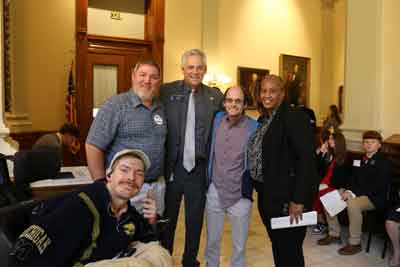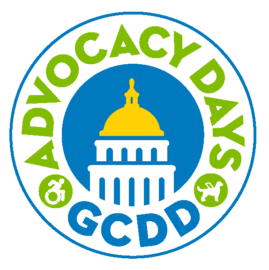 The State of Georgia kicked off its legislative session in January, and the Georgia Council on Developmental Disabilities (GCDD) was front and center to advocate for the disability community across the state. During the session, GCDD hosted its annual Advocacy Days at the Georgia State Capitol. Advocacy Days is an opportunity for GCDD, self-advocates, and the developmental disabilities (DD) community across Georgia to meet, educate, and inform legislators about issues that are important to Georgia’s disability community.
The State of Georgia kicked off its legislative session in January, and the Georgia Council on Developmental Disabilities (GCDD) was front and center to advocate for the disability community across the state. During the session, GCDD hosted its annual Advocacy Days at the Georgia State Capitol. Advocacy Days is an opportunity for GCDD, self-advocates, and the developmental disabilities (DD) community across Georgia to meet, educate, and inform legislators about issues that are important to Georgia’s disability community.
This year, there were three days of advocacy at the Capitol focusing on:
- Increase funding for Inclusive Post Secondary Education (IPSE).
- Increase in wages for direct support professionals (DSP) and an increase in the number of Medicaid waivers allocated to people with DD each year.
- Employment equity (abolishing 14(c), the law that allows employers to pay subminimum wages to people with disabilities).
Additionally, GCDD hosted “A Seat at the Table: A Transformative Conversation Around Equity, Disability and Support” at the Georgia Public Broadcasting office in Midtown Atlanta, led by Story Muse, in partnership with Equitable Dinners, L’Arche Atlanta, and Out of Hand Theatre. It brought together art, dinner and discussion about the value of equitable opportunities and support in the lives of Georgians with DD and their families.
IPSE Day – January 24, 2024
Georgia has been leading the way in advocating for Inclusive Post Secondary Education (IPSE) programs. Currently, the state has nine schools supporting people with intellectual disabilities (ID), with a 10th program starting at Berry College in Rome, GA.
These programs tap into the potential of college-age students with ID to learn skills and get education that can help them to join the workforce as skilled and talented employees and to live independently after college.
In 2023, GCDD and its partners advocated for receiving funding from the General Assembly to fund a state-supported IPSE scholarship to help make these opportunities more affordable. This year, the community is seeking to expand the program.
Students and representatives from University of Georgia, Berry College, Albany Tech, Georgia Tech, Georgia State University, and East Georgia State College came together on January 24, 2024 at the Gold Dome to meet their representatives and discuss the opportunities available at their schools and how more funding towards scholarships will support more students and families to afford these programs.
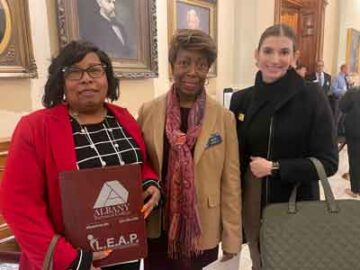
Attending Advocacy Days for the first time was Regina Watts. She is the director of the Leveraging Education for Advancement Program (LEAP) at Albany Technical College. LEAP has been in existence for six years and is the only IPSE program at a technical college.
She joined the advocates at the capitol to stress the importance of the IPSE program.
“My goal here today is to open up doors for more technical colleges because Albany Tech is the only technical college in the state of Georgia that has an IPSE program,” said Watts. “With additional program fees that we are asking for, other technical colleges can have the opportunity to bring in students to take advantage of the college experience.”
While certification from Albany Tech is the road to employment for many of the IPSE students, some continue with their education for additional certifications.
“The majority of our students are leaving and becoming employed. We have students that are working at the Phoebe Putnam Memorial Hospital. We have students that work at the Marine Corps logistics space. We have students working at the YMCA. We have students that are going on to get a different certificate,” she said, adding that one student was to become a certified nurse assistant.
“It opens up doors for our students to believe in themselves and the sky’s the limit,” Watts said.
Throughout the day, students and program directors moved around the Capitol building, stood at the ropes to meet their legislators, and had some memorable moments while advocating for their school programs.
The students from UGA attended the Higher Education Committee meeting, arranged by Rep. Gaines (R – District 120). There, they were able to speak to the committee to thank them for their support of the program that has helped so many students with disabilities build confidence, camaraderie, and careers.
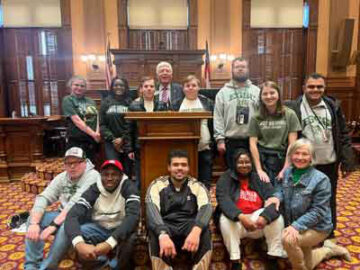
At the same time, students from East Georgia State College, from Swainsboro, got a glimpse into the life of a representative and how their work is done. They visited Rep. Larry J. “Butch” Parrish (R – District 158), who represents Swainsboro, in the Gold Dome. In their visit, Rep. Parrish commented on their advocacy efforts, reminding them that communicating with their local elected officials is always important.
“I got some letters from some of you guys, some emails, and we sent you a letter back,” said Parrish. “We sent a letter in response to your emails about the funding on the program and we’re going to do all we can to try to make sure that continues too.”
The students and program directors got to visit the chamber floor where bills and laws are discussed and voted on.
Learn more about the IPSE Advocacy Day: Advocacy Day at the State Capitol Brings IPSE Students to the Spotlight
Learn more about the results of the legislative asks for IPSE: Nothing About Us Without Us: A Recap of Georgia’s 2024 Legislative Session
Waivers and Wages Day – February 8, 2024
Georgia’s disability community is in a state of emergency regarding the Medicaid waitlist and direct support professional (DSP) wages. Currently, Georgia has a waiting list of over 7,000 people in need of home and community-based services (HCBS).
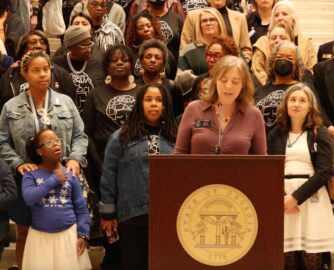
“It’s been 25 years since the Supreme Court’s Olmstead decision, which said that people with disabilities have a right to state-funded services to live and thrive in their communities rather than being forced to live in institutions,” Rep. Sally Harrell (D – District 6) said at a press conference during Advocacy Days at the Capitol. “And it’s been nearly 16 years since our state entered into a settlement agreement with the Department of Justice and committed to giving Georgians with intellectual and developmental disabilities the support they need to live in their own homes and lead productive lives.”
Harrell has been a long-time champion of the cause to end the waiting list for Medicaid waivers.
“We’ve made some progress in Georgia with [intellectual and other developmental disabilities] issues in recent years because this community has shown up and been loud and because you’ve been loud, we increased funding for waivers from approximately 100 per year to 500. We passed Senate Bill 610 to ensure Georgia did reimbursement rate studies every four years so that wages for our service providers kept pace with the markets,” she said.
Harrell and Sen. John Albers (R – District 56) co-sponsored a senate study committee on Georgians with DD to create a roadmap to deliver on the promise that Georgia made 16 years ago to build on a comprehensive community support network. Harrell added that now it’s a simple three-step process.
- Pass Senate Bill 198 creating a Georgians with Intellectual and Developmental Disabilities Innovation Commission. This is modeled on the successful Behavioral Health Commission made up of experts and advocates that will roll up their sleeves and work on updated solutions for the long-term challenges of Georgians with DD. The commission will tackle issues like supportive employment, housing, managed care and more.
- Fully fund the DSP provider rate study in the Fiscal Year 24-25 budgets.
- End the waiting list for NOW and COMP waivers. According to the state, NOW offers services and supports to enable individuals to remain living on their own or in their family home and participate in the community. COMP is for individuals who need comprehensive and intensive services to live in the community and not a residential setting.
“Individuals are waiting for supports and services that are vital to avert the crisis, to support people in a way that they should be supported in their local communities with their families,” said Harrell. “Telling a family to wait for I/DD support services and to wait for a waiver is like telling a hungry family to wait for food stamps. This is sustenance. These services keep families together and we have to stop making people wait.”
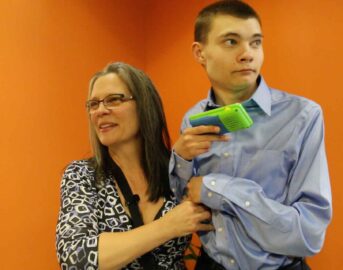
Priscilla Hackstadt came to the Capitol to advocate for her son Christopher, who is non-verbal. He’s 18 and has a rare genetic condition called Phelan-McDermid Syndrome, which means he doesn’t develop like other kids. Right now he’s in a transition program in Gwinnett County. When he turns 22, he will age out of the school system.
“[Without] a NOW or COMP waiver, we won’t have the funding to put him in an adult day program. And that’s a big concern for me. That’s why I am here doing advocacy days,” said Hackstadt. “Christopher is nonverbal and requires full, sometimes partial assistance with all activities of daily living. We’re talking about toileting, bathing, dressing, eating, and if he doesn’t have a program that’s like the one that he’s in right now with the Gwinnett County School system, then that means that he’s not out in the community. He’s not going to be thriving, he’s not going to be learning. And it breaks my heart to think about that.”
Tais Keyser, a Johns Creek mom and an advocate with Unlock GA, a broad-based coalition whose mission is to expand and enhance home and community-based services to fully support Georgians with DD, spoke out on behalf of her oldest son, Isaiah.
“He is 22 and has autism, an intellectual disability, and he struggles with a mental illness,” she said. “He needs support to dress himself appropriately. He doesn’t grasp the concept of time or money. His reading level is at a kindergarten level. Isaiah needs help with the simplest things like pouring milk. He needs long-term support for the rest of his life.”
Like Hackstadt, she fears for her son’s quality of life.
“I applied [for the NOW/COMP waivers] four times and I was denied four times. The last resort was to sue the Department of Behavioral Health. After spending $60,000 in expenses, I won. After years of fighting, Isaiah was finally deemed eligible,” she said. “It was emotionally, financially draining for me and my family and that was just to get my son a spot on the list. Technically, we do not have the waiver.”
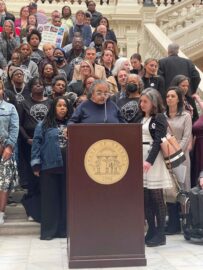
Dorothy Harris of Fitzgerald, GA is a self-advocate with United for Change, a grassroots network of self-advocates across the state. She’s been active in self-advocacy for more than 20 years.
“There has to be a group of legislators who learn and listen and better understand what we need so that we could grow as contributing citizens in our community,” she said. “A commission will give us a place and a government official to discuss our hopes and dreams and issues like transportation, employment, affordable housing.”
She added that it’s important for DSPs to make a livable wage.
Last year, the Department of Behavioral Health and Developmental Disabilities (DBHDD) funded a rate study around DSP pay. The study found that Georgia’s DSP community desperately needs a rate increase to help support people who work in this field. GCDD has been meeting with legislators, gathering support and advocating to ensure that the DSP rate study be fully funded. That would come out to $107 million. In addition to funding for DSP wages, GCDD has requested that the state support an additional 2,400 waivers annually, which is about $65 million. Read more here.
DSPs also came to Advocacy Days to make their voices heard. Wearing black t-shirts with a woman’s face on it, the lettering in the hair spelled out “We Dream in Black.” Convening from throughout the state, most of the workers were Black and brown women. Many started off caring for family members and found they had an aptitude for the occupation.
Sharon Brawley now works in private home healthcare, but there was a time when her patients were those who relied on Medicaid waivers for payment of services.
“We [were] overworked and you had to do a whole lot of everything, which was the job, but it was not enough compensation because Medicare and Medicaid wasn’t paying overtime,” she said.
Although her situation has improved, she speaks out for the Macon area.
“These people are taking care of their family, but [the system] was leaving them out in the cold,” she said. “Through this job I learned that you have to just really take the money out of the situation and just give [the clients] the best care that you can give them. So that’s why I’m still in home healthcare and I don’t think I’m going to ever leave it. Whether the pay changes or not, it’s not about the pay.”
That was the sentiment across the board. People who care about providing needed services want to do a good job and be able to take care of their own families financially.
Shaquel Williams said that working with people with DD requires special skills and certified annual training.
“There are certifications every year that cost money for people who are making probably $10 to $12 an hour and you’re paying like $500 to be certified in your job,” she said. “[We have] all the love it takes to be a home care worker. We just want the pay to go with it.”
Learn more about the advocacy progress on Waivers and Wages: Nothing About Us Without Us: A Recap of Georgia’s 2024 Legislative Session
Advancing Employment First and Ending Subminimum Wage Day – February 21, 2024
Last year, the DD community in Georgia identified an underlying issue around paying people with disabilities below minimum wage, also known as subminimum wages. It is legal in Georgia to pay people with disabilities below minimum wage compared to those without a disability.
During the 2023 legislative session, GCDD’s public policy team met with legislators to talk about the issue. The conversations continued over the summer and a bill was presented to help end this unfair practice. The “ask” during Advocacy Days was to get the bill passed.
Rep. Sharon Cooper (R – District 45), chair of the public health committee has actively sought to end the legality of section 14(c) of the federal Fair Labor Standards Act in the state of Georgia. Under 14(c), employers who are granted the certification from the federal Wage and Hour Division are allowed to pay special minimum wages — wages less than the federal minimum — to workers who have disabilities that reduce their level of productivity for the work they perform.
She and Rep. Scott Hilton (R – District 48) have sponsored House Bill 1125 which will end the practice of paying subminimum wage to individuals with disabilities.
“Chairwoman Cooper and I were shocked to find that on average folks with a disability are paid somewhere just above $3 an hour,” said Hilton. “Your work is meaningful. Your lives are meaningful. We want you to work, be productive and earn a wage that is commensurate with what you deserve.”
Hilton knows first-hand how the unfairness of this practice can affect a family.
“As the father of a child with a disability, my son, 14 years old, Chase, when he grows up, I want him to work in a happy, healthy, productive job earning a wage at what he ought to be paid,” he said.
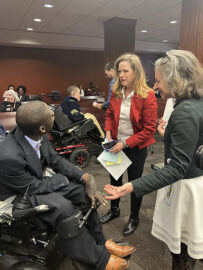
Stacy Ramirez’s 29-year-old son has autism and she has a 2-year-old great niece with Down syndrome. Speaking as public policy liaison for the Georgia chapter of the Association of People Supporting Employment First (GAPSE), she represents an organization that focuses solely on employment and careers for people with disabilities.
“[My son] Ryan needs supported employment to help him better understand the social interactions of coworkers, to break down the steps of what he’s meant to accomplish, what he’s hired to do. If you break down those steps and you have the right supports, he shines,” she said.
Although he’s not a drinker, he worked at a bar where he knew his job and was respected by his employer and the patrons. The establishment went out of business and now Ryan is back at the beginning looking for a job that will allow him to work and make a fair wage.
“For me, abolishing 14(c) is a human rights step in the right direction,” said Ramirez. “I found it best to work alongside a supported employment agency that has the same values as Ryan and I do. And that’s true employment looking towards a long-term career.”
Danny Hoover is the Chief Operating Officer of Diversified Enterprises in Tifton, Georgia. It’s an agency that works to empower individuals with support to live, work and participate fully in their communities. He brought a group to Advocacy Days to show that people with disabilities want the same things as everyone else – fair wages.
“We only provide community integrated employment. So no person that we support does any type of work or receives any type of support that is outside of a place and time that they want,” said Hoover. “It is really exciting because we have some people that … work for the city and county and do some maintenance type work. But then we also have someone that works at the Harley Davidson shop and she does some clerical work there. And then we also have someone else that works for another agency that helps to support us as an agency.”
Hoover added that there are no limits to what people in the disability community can do.
“We have people that are right now trying to seek entrepreneurship. So we’re going to try to tap into Synergies Work here in the state of Georgia and see if we can get that person on an entrepreneurial path. And then we also have people that work at the hospital and we have people that work in grocery stores. We have people that work in factories, we have people that work in distribution centers and those sorts of things,” he said.
One of his success stories is Lance Smith who works for Tift County in the UGA extension office.
“I clean there. I sweep, take out trash, I mop, I clean bathrooms and I work three days a week, four hours each day from 8 a.m. to 12 p.m.,” he said.
Smith had a job coach who showed him how to perform his work without supervision and stay on task.
Lance has been at his job for three years and enjoys that he has his own money to enjoy the things he likes to do. The support and feedback that he receives has boosted his confidence so much that he has advice for anyone like him who is reluctant to try employment.
“I would say go for it,” said Smith.
Yolanda Powell is the new community employment manager at Diversified Enterprises. She supervises job coaches, onboards new people who need support and helps them find jobs that they desire.
“When I first started with Diversified, I was a job coach in supported employment and it was tough working. I actually helped meet the cleaning crew and it was tough doing that work because I could see the talents, the gifts. I could see the hunger in the individuals wanting more,” she said.
At the time, Diversified was a company that had a certificate for 14(c), but eventually, group work, what they call enclaves, went away and the people were trained for individual tasks.
“People began to be put in typical jobs with competitive pay,” she said.
Before working at Diversified, Powell was at a Target distribution center. She had a coworker with DD and through Diversified she eventually became his job coach.
“It was good seeing the movement of 14(c) going away,” said Powell, adding that it was 2007 when things changed at Diversified. Powell has a 12-year-old son with Down syndrome who talks about the day he’ll get to go to work.
“We’ve gone from being a firefighter to having his own food truck,” she chuckled.
Powell is overjoyed to be a part of a future where people like her son can see their employment dreams come true.
“We’re really focusing on those gifts and talents that people have and that they’re willing to share. … They want to share their talents, they want to contribute, they want to be a part of the working world,” Powell said. ”When I think about my son six years [or more] from now … when he’s 17, 18, 20 years old, [he’ll be fulfilling his dream] by having that taco food truck being an entrepreneur.”
Learn more about the advocacy progress on Employment: Nothing About Us Without Us: A Recap of Georgia’s 2024 Legislative Session
Becoming An Advocate
Building relationships with elected officials and speaking up for oneself is important when it comes to advocacy. In order to help build confidence and ensure that they have the proper information and tools to complete their mission of educating and urging laws and appropriations for people with DD, GCDD organized virtual and in-person events to prepare the advocates.
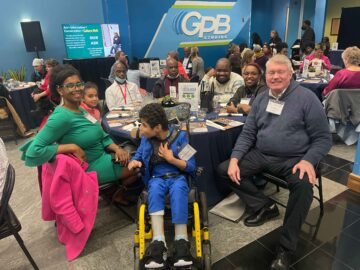 On February 6, 2024 at Georgia Public Broadcasting, GCDD hosted “A Seat at the Table: A Transformative Conversation Around Equity, Disability, and Support.” An additional virtual event was hosted on February 27th.
On February 6, 2024 at Georgia Public Broadcasting, GCDD hosted “A Seat at the Table: A Transformative Conversation Around Equity, Disability, and Support.” An additional virtual event was hosted on February 27th.
These two gatherings brought together art, dinner and discussion about the value of equitable opportunities and supports in the lives of Georgians with DD and their families. It is the latest work of the GCDD Storytelling Project led by L’Arche Atlanta.
Working alongside GCDD and L’Arche were Georgia based Equitable Dinners and Out of Hand Theatre. Equitable Dinners has paired with Out of Hand Theatre and they both have years of expertise creating meaningful conversations and change around educational racial disparity issues through the combination of art and dialogue and bringing people of diverse backgrounds together in a facilitated conversation about complex issues. This was the organization’s first event focused on disability.
Sahlimah Abdullah, 14, and her mom Sadiyah Abdullah attended the dinner as their first foray into advocacy. It was also their first time advocating with GCDD this year.
“I really want to make sure that she can have her needs met by being able to speak for herself instead of me speaking for her all the time,” said Sadiyah Abdullah, who attended the Equitable Dinners event.
As an educator, Sadiyah Abdullah is used to advocating for children with disabilities.
“I was a principal, and so I really fought for parents to have a strong voice whenever we held IEP meetings. And then God decided I’m going to give you one that you can train up for yourself,” she said.

Sahlimah Abdullah had been in inclusive settings in elementary school, but when she transitioned to middle school, her parents were told she didn’t belong in the same classes as the other students.
“I was the one that was doing all the advocating on her behalf, and that’s not what I want,” said Sadiyah Abdullah.
Meeting with her state legislators and making her concerns known was a valuable lesson for Sahlimah Abdullah. She’s been in ballet since she was four years old and was recently accepted into the School of the Arts program in Columbus, Georgia.
“She was the first child with Down syndrome to have been accepted into the program. So that’s why we had a lot of pushback,” said her mother.
The middle school experience prompted Sahlimah Abdullah to insist that her mother home-school her.
“That was her first introduction into advocating for herself. Because what she was telling me … that setting was not meeting her needs,” said Sadiyah Abdullah. ”That’s when I really started to understand I have to give her the words and the experiences to be able to stand up for herself.”
The encouragement to tell her story has kept Susan Berch on her path of self-advocacy. She also attended the Equitable Dinners event.
“I’ve been in many advocacy programs – Partners in Policy Making, My Voice by Petition, My Full Word. And then I joined Uniting for Change in 2019 or 2020. Self-advocacy means the world to me. It means speaking up [for] your rights and others with disabilities,” she said. “Rise up and speak out. It’s very important. If you don’t speak up, you’re not going to get what you want in this world.”
Berch has lived on her own since 1993. She has a dog, Gabby. She pays her own bills, takes public transportation and enjoys outings with friends.
“I feel that advocacy is a way to recognize people with developmental and physical disabilities. People should be recognized for who they are,” she said. “My parents raised me to do what I can and to let me try new things. They do not in any way hold me back.”
Learn more about the Equitable Dinners event: GCDD’s Equitable Dinners “A Seat at the Table” Event Provides a Transformative Conversation Around Equity, Disability and Support During the 2024 Legislative Session
The Work Continues
The end of Advocacy Days isn’t the end of the work for self advocates – the work continues.
“Everyone wants to be able to live independent lives, to work, play, have kind of their own autonomy over their own lives. And so this is kind of a way of bridging that gap,” said Ryan Shindler, GCDD’s Public Policy Fellow. “Like getting rid of subminimum wage for people [with disabilities], providing active hiring within the state for people [with disabilities], things like that to really ensure us to live independent lives within our community.”
And 2024 brings us another presidential election year. This year, not only will Georgia residents vote for a president, but all seats in Georgia’s General Assembly are up for election.
Self-advocates are encouraged to keep up with their state assembly representatives and senators and continue building relationships in the following ways:
- Keep your connections! Visit legislators at their local office in your district. Attend functions where they are in attendance when you can.
- Continue to share news about efforts in the DD community to improve quality of life for its members. This can be done through phone calls, emails and visits.
- Track bills that are important to you and congratulate assembly persons when something they sponsored becomes a law.
“Telling my own story is important because it makes it personal to me, but also makes it relatable to the person I am talking to, such as a legislator, because then they know my story and how it affects me,” said Lawrence James “LJ” Young, a member of the leadership collective of Uniting for Change. “And then they can take that and introduce a bill or policy change that would change it for not just me, but other people who have similar situations.”

